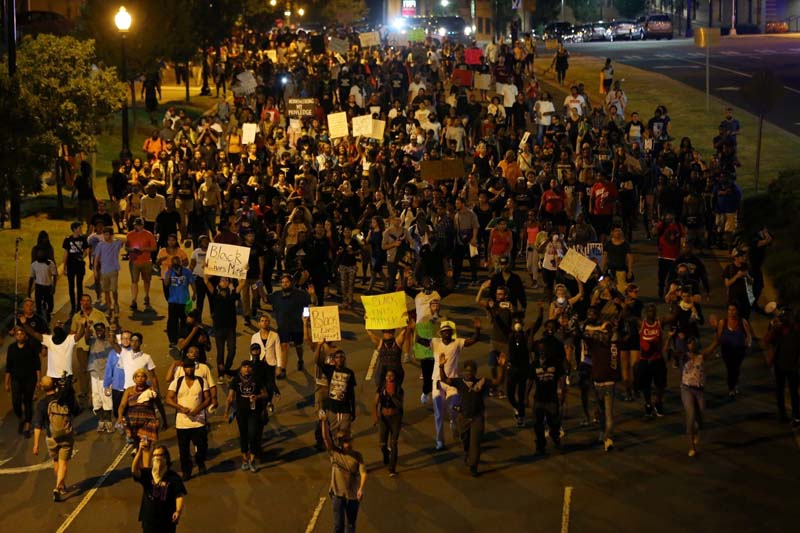Charlotte police videos released but question of gun still unanswered
CHARLOTTE: Charlotte police released two videos on Saturday showing the fatal shooting of a black man that has unleashed days of protests, but the footage failed to settle the central question of whether shooting victim Keith Scott was holding a gun.
Protesters who have gathered in Charlotte every day since the Tuesday shooting demanding that police release the body-cam and dashboard video marched again on Saturday evening, with many carrying signs protesting police violence.
Both Scott's family and protesters have disputed the police statements that Scott was carrying a gun.
The controversy over Scott's death has made Charlotte, North Carolina's largest city and a financial centre, the latest flashpoint in two years of tense protests over US police killings of black men, most of them unarmed.
Before the release of the footage, Charlotte-Mecklenburg Police Chief Kerr Putney acknowledged that the videos themselves were "insufficient" to prove that Scott held a gun. But he said that the totality of evidence, including eyewitness testimony, supported the conclusion that Scott was armed.
"There is no definitive visual evidence that he had a gun in his hand - you can see something in the hand - and that he pointed it at an officer. That I did not visually see in the video," Putney said. "But what we do see is compelling evidence that, when you put all the pieces together, supports that."
In a statement accompanying the video release, police said Scott was shot by Officer Brentley Vinson as he backed away from his vehicle.
"Officer Vinson perceived Mr. Scott's actions and movements as an imminent physical threat to himself and the other officers," the statement said.
Police released pictures along with the clips, including photos of a handgun and an ankle holster that authorities said Scott had been wearing at the time of the shooting.
Police said that the gun recovered at the scene was loaded and had Scott's fingerprints and DNA.
But Scott's family, which released its own video of the encounter on Friday, said the footage showed the father of seven was not acting aggressively and that the police shooting made no sense. The family video, shot by Scott's wife, was also inconclusive on the question of a gun.
Scott "deserved better"
The family said neither of the police videos answered key questions surrounding the case, and left them with insufficient information to form an opinion on whether the officer who killed Scott should face criminal charges.
In one of the police videos, a dashboard-mounted camera from a squad car showed Scott exiting his vehicle and then backing away from it. Police shout to him to drop a gun, but it is not clear that Scott is holding anything. Four shots then ring out and Scott drops to the ground.
A second video, taken with an officer's body camera, fails to capture the moment of shooting. It shows Scott standing outside his vehicle before he is shot, but it is not clear whether he has something in his hand. The officer then moves and Scott is out of view until he is seen lying on the ground.
Both videos show Scott moving at a measured pace with his hands at his sides. At least five people who appear to be police officers are seen in the bodycam video.
Scott's family and family attorneys said the videos showed Scott walking away slowly from officers at the time he was struck by bullets.
"He doesn't appear to be acting aggressively to the officers on the scene," Justin Bamberg, a lawyer for the Scott family, told a news conference.
Ray Dotch, Scott's brother-in-law, said much of the media attention has focused on what kind of person Scott was. Although he was a "good person," Dotch said, what really matters is that "he was an American citizen who deserved better."
Another lawyer for the Scott family, Charles Monnett, said, the family did not know enough of the facts to know whether the officer who killed Scott should face charges.
Hundreds marched through the center of Charlotte on Saturday evening, including white and black families protesting police violence. Some carried signs reading "Stop police brutality" while some signs showed a picture of a bloody handprint with the phrase #AMINEXT.
Some marchers angrily told media to leave the demonstration, but the city was less tense than on Friday night. Restaurants and bars were livelier, and many patrons came outside to watch demonstrators chanting "No justice, no peace, no racist police."






